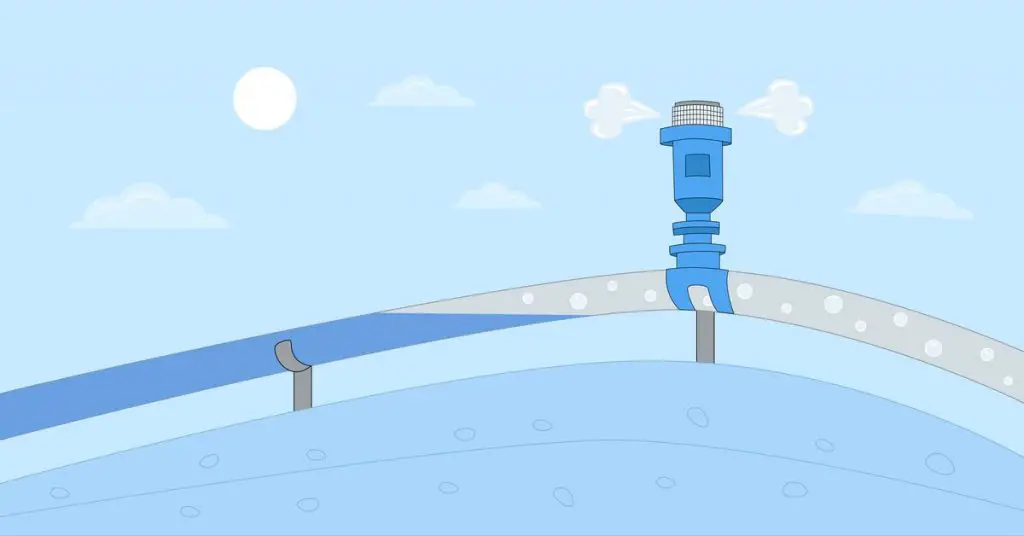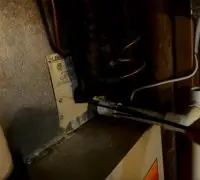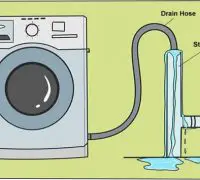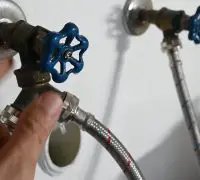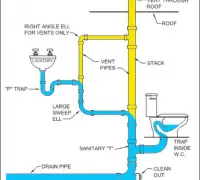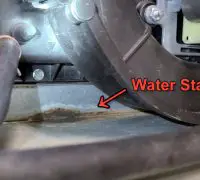Coming back home after a long day at work and taking a hot shower is something most of us want. We will not enjoy having irregular water flow in the faucet while trying to have a hot shower. It’s more annoying when you don’t have all appliances run simultaneously.
Air in the water lines is one reason for that to happen. Even if it’s not a severe issue, it’s a wise idea to fix it– it’s less complicated than you think!
Page Table of Contents
- How does trapped air in water pipes sound like?
- How come your water lines have trapped air?
- Will air in water pipes cause damage?
- How to eliminate air in water pipes?
- What if there’s air in the hot water line?
- How to remove air in hot water pipes?
- How do you remove air in a well-fed system?
- Is this problem common for gravity-fed systems?
- Do you still notice strange sounds coming from the water supply?
How does trapped air in water pipes sound like?
A hiss or a pop noise coming from the pipes signal that there’s air in your water system. The reasons are many and range from simple to complex. Whether it’s air in the main water valve, in the hot water faucet, the toilets, or all the faucets, you should check out and eliminate the cause.
It’s not only the hissing and sputtering water that signal air in water pipes. A loud or banging noise coming from the lines is also a concerning sign. If so, it’s not water flowing through the pipes but air. You shouldn’t call the plumber in the middle of the night to remove air from the water pipes. At the same time, you shouldn’t postpone solving the plumbing problems, especially since the fixing is relatively simple.
Also, if you notice hammering noises, it means that there’s water in the pipes – it’s there to maintain adequate pressure in the pipes.
How come your water lines have trapped air?

Should you turn on the faucets and see that all the water is spitting/sputtering out air, you deal with air trapped in the pipes– it’s also known as an airlock. This acts as a restriction and reduces the water pressure in faucets and toilets, the dishwasher and washer, etc., causing irregular water flow in the house. Sometimes it can even cause a complete shut-off of the water in the faucets.
Air gets inside the water system in many ways. It can get inside the water pipes when new plumbing is added. It can also get inside your plumbing when the municipality works on the neighbor’s water line. The valves in the pump can be another reason for air in water pipes.
Temporarily shutting off and draining water to a house (by the municipality during maintenance or by the homeowner) will cause air to enter the pipes. A faulty pump, pressure tank, and even drought are reasons for airlocks with a house with well system.
Typically, pumps have two valves: the check and the foot valve. When one of them becomes loose, air may get into pipes. We recommend you check out the pipes at your house and see if they’re tight enough. Should the problem be severe, installation of a new valve could be necessary. A professional should do it.
Every time you do plumbing maintenance work, such as setting up a new bathtub/toilet or draining the water heater, you need to shut off the water drain inside the pipes. Since vacuum cannot exist in water pipes, air will take up the space inside. When you turn on the water flow, air will become trapped at the high points in the water pipes and cause an airlock.
The water heater is another possible cause. Most water heaters need to be purged from time to time. Otherwise, you will deal with air trapped inside the water pipes. The feed line of the water supply has to be placed deep in the well. Air will get in your water pipes when it’s not placed deep enough.
Will air in water pipes cause damage?
Many people fear that the noises coming from the water pipes signal severe issues. However, the trapped air won’t damage the water pipes but only cause the annoying noise that you hear from time to time. You won’t have to call a professional plumber to fix the problem most of the time.
The irregular water flow is another unpleasant effect of air bubbles in the water pipes. All in all, trapped air in water lines is rather annoying and won’t cause severe damage to the dishwasher, water pipes, faucets, toilets, and other appliances in your house.
We want to highlight that air in the pipes isn’t the same as water hammers. The water hammer occurs when you open the faucet and close it too fast. Water hammer happens when water flowing to a specific tap or appliance is pushed to change its direction because a faucet is shut off.
It’s important to remind you that this problem won’t clear on its own. When it works as a restriction, removing trapped air is crucial. Since water pipes are rarely straight, the airlock won’t solve on its own as it takes the highest point of the pipes.
How to eliminate air in water pipes?
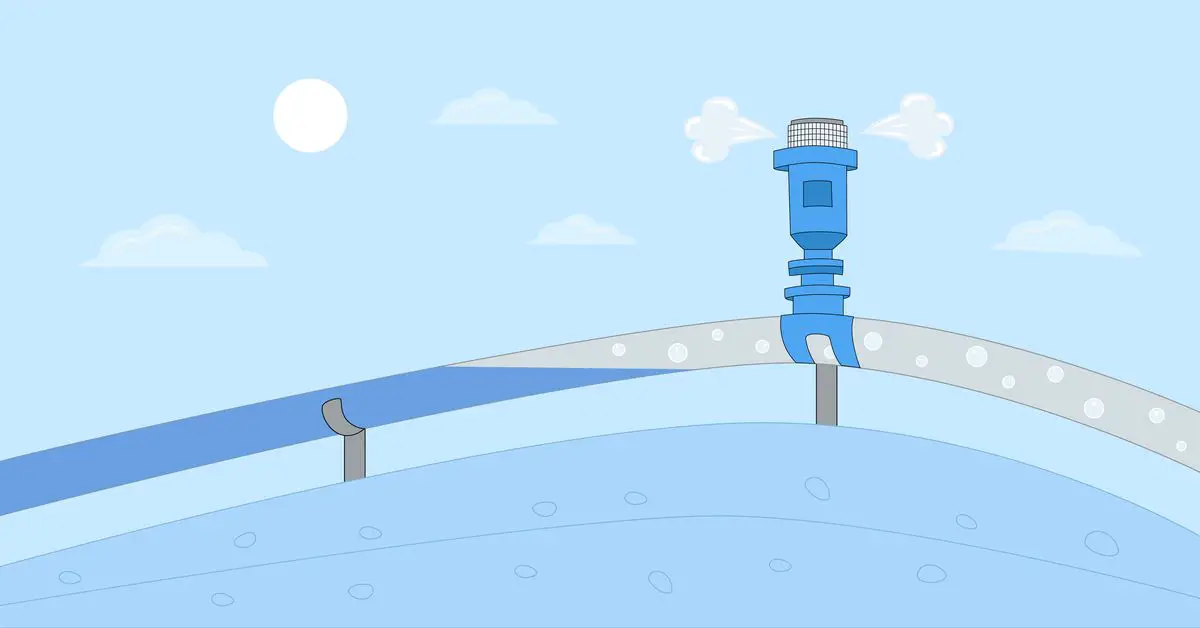
Home plumbing problems can be tricky, but trapped air in the water pipes isn’t one. Noises coming from the water pipes, running faucets, toilets can signal air’s presence in the water pipes. The first step to take is to shut off the main water valve in your house. Let’s take a closer look.
Find the main
You don’t need to be a plumber to know where the “main” is in your home. The “main water supply” or water shut-off is the valve placed where all the water enters your home. If your house is old, the main is most likely a star-shaped/garden-hose-style gate valve. You are able to open it going left and close it when going right.
You want to start by shutting off the valve. If you cannot shut it off completely, avoid forcing it. Hard water could have calcified the shut-off valve, so you will damage it by causing it. We recommend you hire a plumber and have him replace the star-shaped valve with a new lever-type main valve.
Let it out 1/2 – turn at a time
If you know there’s air in the water pipes you have to remove it systematically. After shutting off the main water supply, you open all the faucets about 1/2 turn, both cold and hot. You also need to run the washing machine (rinse cycle)and the dishwasher. Also, flush every toilet in your home and open the outside spigots. You also have to drain the pot filler and fridge water line.
Re-supply water
Now that all faucets and water-using appliances are running, it’s time to re-supply the system from the main. You will need to flush the toilets once again. After flushing, you will need to wait for 3 minutes. Then, go to the faucets close to the valve and turn them off. You have to follow the correct order so turn off the faucets one by one.
This sequence will help to get the air out of water pipes. Let every faucet, dishwasher, washing machine, etc., run for 10-15 minutes and see that everything is working correctly. Let the water run so that the toilets re-fill and remember to flush them. The water should flow correctly and everything should be back to normal. You shouldn’t hear
If the noises you’ve heard were, in fact, a water hammer, high-water pressure, or a poorly stabilized pipe were the cause. When you don’t notice any improvement after running the water fixing the poorly stabilized pipe and appliances in your home, you should call the professionals for plumbing services.
Should you have a well system and the previous steps didn’t solve the problem of air bubbles in the plumbing system, you might be dealing with a more complex issue. Again, we advise you to contact professionals for assistance.
What if there’s air in the hot water line?
Having air in the hot water pipe is a common problem in the United States. Many people describe it as bubbles in hot water or cloudy water. When you open hot water, the water pressure is higher than expected and you can actually notice some air bubbles in the water. Is it a significant problem? Should you rush into calling the plumber?
Is it dangerous?
Even if it’s not a severe issue, not removing trapped air can cause rust and corrosion in the pipes. Don’t worry about changing hot water faucets in your house or anything like that. The fixing is more straightforward than you think.
What are the causes?
Air trapped in the hot water pipe happens for many reasons. Keep reading to find out more.
Corrosion in the tank
Corrosion of the water heater can occur for several reasons, and not replacing the anode rod is one. The magnesium anode corrosion is made to occur faster than the metal of the tank around it, which keeps corrosion from happening to the hot water tank’s lining.
A bad smell coming from the water in your faucets, contaminated or cloudy water also signals that the problem comes from the anode rod. Should you have this problem with the hot water pipe without any signs of corrosion, you might be dealing with a reaction between the anode and the water. Because of the water, the anode rod generates hydrogen, which leads to bubbles.
Using a Corro-protect powdered anode rod is the most affordable and efficient way to deal with both problems. It’s a solution for the long run and reduces the risk of future issues. A product for protection against corrosion will also eliminate the risk of air in your water pipes.
Water Shut Off
When you shut off the water, air will build up inside the pipes. Maintenance and other situations(vacation, business trips) require water shut off. If you know that this is the only cause of the problem, simply turning on the water will force the air out of the water system.
However, if turning on the water doesn’t solve the issue, you need to investigate the cause further. You don’t want to damage the pipes, so try to fix it as soon as possible. Keep in mind that the quicker you manage the plumbing issues, the lower the bill will be.
Pressure Relief Valve
Should you notice that there’s consistent air in the hot water pipe, we recommend you shut off the water and use the pressure relief valve in the water heater. When you open the valve, you create air to escape, which solves the whole problem. You can only succeed if the valve isn’t the cause, to begin with.
When the pressure relief valve doesn’t work correctly, the water heater in your house will develop problems. It’s because the pressure in the hot water tank won’t reach the adequate level– if it’s too low, it will let air get inside the system. If this is the problem you deal with, you need to replace the valve as soon as possible.
Hose Connections
Sometimes, tightening things is everything you need to do to fix an issue. Maybe the pipe connections and the hose require tightening. It only takes a bit of sediment, silicone, or other contaminants to get in the connection and create a tiny space for air to get inside the pipes. As long as you’re 100% sure that there’s no leaking water and there’s no problem with the connections, simply tighten the hose connections.
See that everything is tight
If you suspect that the water heater is the cause, you need to pay attention to signs such as sputtering from the hot faucet only. When sputtering also happens with the cold water faucet, the chances are that the problem is with the entire water system.
You can try ad remove air pockets by turning on all faucets in your house. If the problem lies in the tank, you will need to purge the air out of the system.
How to remove air in hot water pipes?
Here’s an effective method to remove trapped air from double-handles kitchen or bathroom faucets:
- use your palm to block the faucet spout. Press it firmly against it to make sure that water doesn’t flow out after turning the faucets on.
- Turn on the hot water faucet. You shouldn’t feel the water on your palm if there’s an airlock in the hot water line.
- Turn on the cold water– do it all the way,
- wait for 30 seconds,
- turn off the cold water to the faucet
- remove your palm.
The water should flow out nicely from the faucet after shutting off the cold water. It might be lukewarm at first, so don’t worry about it.
Do you still notice air in hot water lines?
If you’ve tried all the possible causes and solutions but still haven’t managed to succeed, we advise you call a plumber. Keep in mind that even the hot water heater could be the problem and not run properly. A professional can come and electrically inspect the lines in your house.
This is the last and the most expensive solution for such issues with the hot water lines. It’s never wise to postpone plumbing problems as they don’t solve on their own. You might save money now, but you will spend a lot more if you delay fixing plumbing problems. It’s never a good idea to risk severe damage to the system that requires expensive plumbing work.
How to prevent similar problems in the future?
As with anything else in life, it’s easier to prevent than fix. We recommend you stay on top with regular maintenance of the hot water system and add equipment such as the powdered anode rod. It’s the easiest and most effective way to ensure you have clean water in your house.
Air in hot water lines can be a simple and annoying issue, but it can also turn into a more severe problem. You won’t know what it is until you check it out and try fixing it.
How do you remove air in a well-fed system?
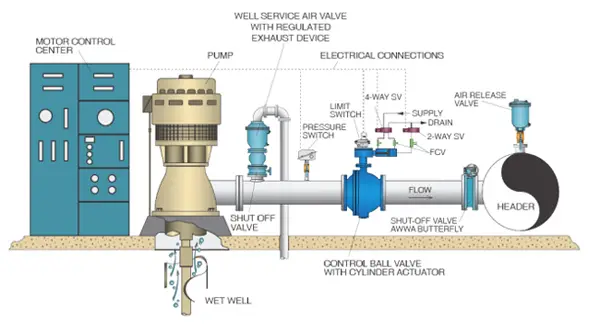
If you have a well-fed system, there are three possible causes of such a problem:
Take a look at the valve
Take a look at the valve as it can cause air to get inside the water system. Typically, the valve is located close to the pump. It may have become loose and now sucks in air from the outside. Simply examining it will help you see if this is the problem. Tighten the valve and observe if the problem persists.
A word on safety
Plumbing issues require attention from professionals and we encourage you to call a plumber to examine the valve once again. If the valve is faulty, it can generate severe issues. While it sucks in air, the valve can also get contaminants into the system. They can pose a threat to you and your family’s health. Underestimating the importance of a properly functioning valve for your well-fed system is a bad idea. All defective valves require fixing and even replacement.
Water level
Low water levels can also generate air in the system; drought and overuse can cause this effect. The fixing is simple and you only need to add a few feet of length to the pipe running from the pump to the water. It’s not a job to do on your own and we recommend you contact a trained professional for plumbing installation.
Methane Gas
Methane is a natural gas and it can be present in areas with well-fed water systems. It becomes flammable in high concentrations and depletes oxygen. Methane gas can dissolve in water.
With the well-fed system, pressure will force water to the surface, so the temperature increases and the pressure drops. As a result, the methane will get in the water. It looks like the bubbles are coming out when you open a can of soda.
Aeration is the most popular method to eliminate methane in the well-water. The technique combines air into the water, eliminating the gas out.
Stay safe at all times
If you discover traces of methane in the well, you need to regularly examine the levels to make sure the levels don’t increase.
Is this problem common for gravity-fed systems?
For the gravity-fed systems, this problem appears because of the water being shut off due to maintenance. If the water is turned on suddenly, the air becomes trapped. The fixing is simple and you only need to run the fauces until the water flow goes back to normal.
Do you still notice strange sounds coming from the water supply?
If the problem persists after you push air out of the pipes, you might need to call a professional to inspect the whole plumbing system. Trapped air is one of the many causes of weird noises in the water pipes. DIY fixes are ideal, but they’re not always possible.
